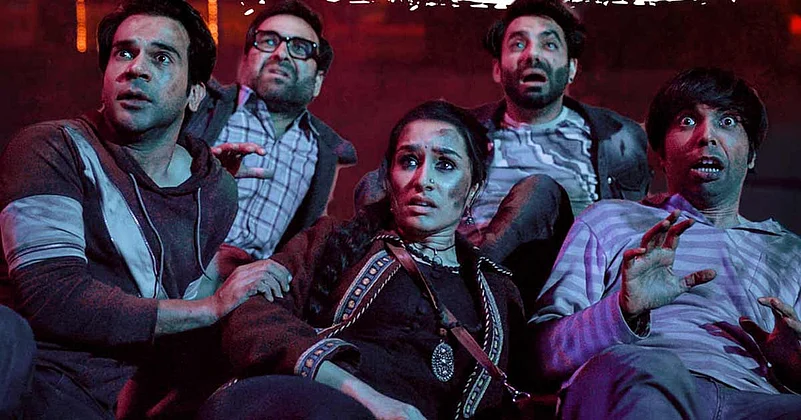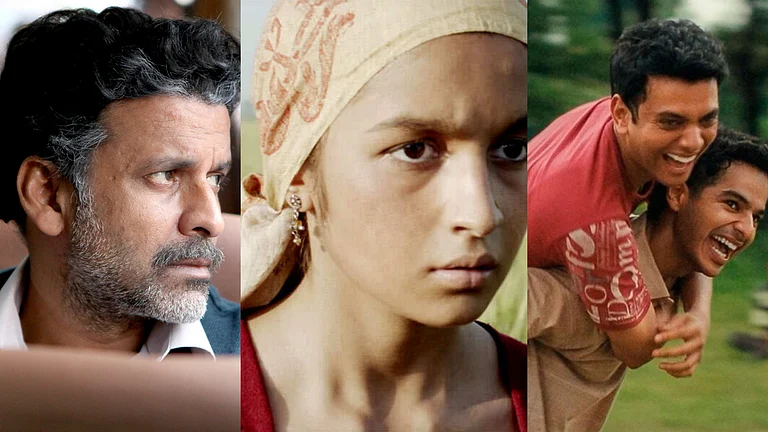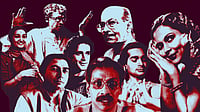The recent emergence of the feminist horror genre in Hindi cinema has been generating a lot of interest, especially with the latest release of Amar Kaushik’s 'Stree 2', a riveting sequel to the 2018 horror comedy 'Stree', which revolutionised how horror tales would henceforth be told —from the woman’s perspective. Films like Prosit Roy’s 'Pari' (2018) and Anvita Dutt Guptan’s 'Bulbbul' (2020) followed suit with their strong and layered women protagonists leading the narrative and taking on the men who had wronged them. Much has been said about how the ghost/witch/demoness in these films disturbs the patriarchy with her righteous revenge. But what about the men? How are conventional notions of heteronormative masculinity looked at in these feminist horror films?
Before 'Stree', Priyadarshan’s 'Bhool Bhulaiyaa' (2007), a Hindi remake of the 1993 Malayalam film 'Manichitrathazhu', sowed the seeds of rebellion by centering its narrative on the tale of a female ghost, Manjulika, who had faced injustice at the hands of a wicked king and was out to seek revenge for the triumph of good over evil. However, the film ultimately ends up placing the redemption of Manjulika in the hands of Dr. Aditya (Akshay Kumar), the quintessential male saviour without whom the crisis in Hindi cinema’s narratives can never be resolved.
In 'Stree' (2018) too, there is a male rakshak named Vicky (Rajkummar Rao), who must save the men of his small town Chanderi from the terror of Stree, the woman ghost who haunts the streets during the four nights of a female deity’s festival. But the film interestingly subverts the conventions of the genre through the task that Vicky must take on to get rid of Stree. The ghost is not to be conquered through vengeful elimination, he comes to realise in the climax, but through love and respect—the two things she was denied in her lifetime. The folklore of Chanderi, called the Chanderipuran, depicts Stree as a beautiful courtesan who was desired by all the men of the town. But when she finally decided to marry her lover, the jealous men killed them both on their wedding night. Following the suggestions of the lore, Vicky is identified as the rakshak of Chanderi due to his identity as a courtesan’s son and because there is “love in his eyes” —two rather intriguing characteristics to take on a ghost in a horror film.
In 'Stree' and 'Stree 2', Vicky is a goofy character who has been raised single-handedly by his father and is famous as Chanderi’s best ladies’ tailor. It is in the way that his character is sketched that the film subverts the normative depiction of a hypermasculine male, who is usually celebrated as the protagonist in popular Hindi cinema. Vicky is not a courageous and confident conqueror, but one who yells and stutters in fear when it comes to confronting Stree. At the same time, he is unable to plunge the dagger heartlessly into Stree’s heart to finish her. Instead of identifying with the men who tormented Stree in her lifetime, he empathises with Stree, however scary she may be, because of the indignity and disrespect she suffered at the hands of the men.
'Stree 2' takes this characterisation even further. In the film, Vicky can hardly even be identified as the protagonist. He is lovelorn and delusional and takes up the task of confronting Sarkata, the headless ghost, only at the insistence of the nameless love of his life (Shraddha Kapoor). As it turns out, it is not Vicky who can ultimately conquer Sarkata, but Stree the ghost, and Vicky is at best only required to assist the nameless girl in the task of seeking redemption for her mother, Stree. The two films together completely throw off the conventions of the horror genre and normative masculinity is subverted further through the comic portrayal of Vicky and his friends.

In 'Pari', too, the strongest characters of the story are the women. Rukhsana (Anushka Sharma), who plays the daughter of the demon Ifrit, has only seen men who are out to kill her. When she meets Arnab (Parambrata Chatterjee), she is taken by his gentleness and respectful behaviour and eventually falls in love with him. Arnab, a shy and quiet introvert, who is preparing for an arranged marriage with Piyali (Ritabhari Chakraborty), is shown to be a progressive man who is quite unperturbed by the fact that his future partner was once in a very serious relationship with another man. He wants to help Rukhsana find a safe shelter because he feels responsible for her mother’s death. The beauty of Arnab’s character is that he is not without flaws. When Rukhsana’s reality is revealed to him, he gives her away to those out to eliminate her out of fear. But his empathy for her ultimately wins even when he fears for his life. Filled with remorse over his blunder, he asks Piyali, “Who is the demon? Her or me?” The child that Rukhsana bears from her relationship with Arnab is not a demon, but human, because it is born out of consent, unlike the demon children of Ifrit, who are born out of the sexual violation of women. This aberration is made possible only because Rukhsana can fall in love with Arnab. The spectator thus bears witness to an alternative masculinity through the love of a demon.

Among these films, 'Bulbbul' stands out because it presents several characters who represent different shades of masculinity within the feudal household where Bulbbul (Tripti Dimri) is the daughter-in-law. While the twin brothers Indranil and Mahendra (both played by Rahul Bose) are conventional feudal prototypes and violate Bulbbul in different ways, it is the third brother Satya, whose character arc transforms from a doting friend, to one who feels uncomfortable with Bulbbul’s changed assertive self. He turns into the conventional controlling figure who is threatened by Bulbbul’s sexuality and desires her return to her earlier innocent damsel-in-distress self. Satya eventually attempts to kill the chudail, not realising the harm he causes to the woman who was once his confidante. Among the men in the narrative, it is Dr. Sudip (Parambrata Chatterjee), who is the most respectful towards Bulbbul and ultimately wins her trust enough for her to reveal to him her form as the chudail who is killing the misogynist men of the village. Sudip never tries to redeem Bulbbul, even though he asks her about her injuries after her sexual assault. He simply presents himself as a friend who cares for her well-being and is perhaps the only man in the village that the chudail doesn’t intend to harm.
Thus, while the portrayal of feminist ghosts and demons in Hindi horror films is a welcome change, what is even more refreshing is the effort being put in by contemporary filmmakers to imagine their men beyond the powerful stereotypes of heteronormative masculinity.




























